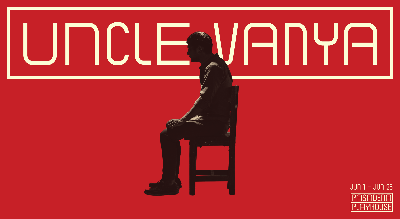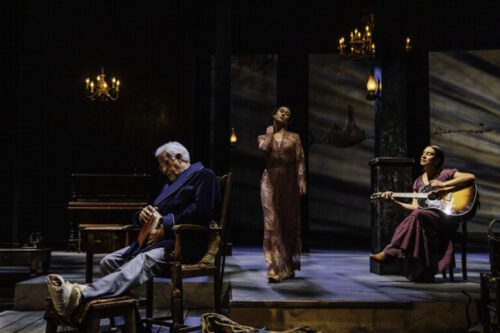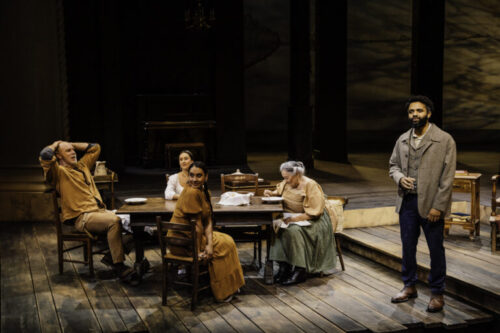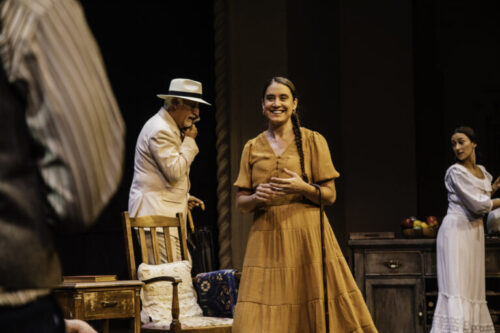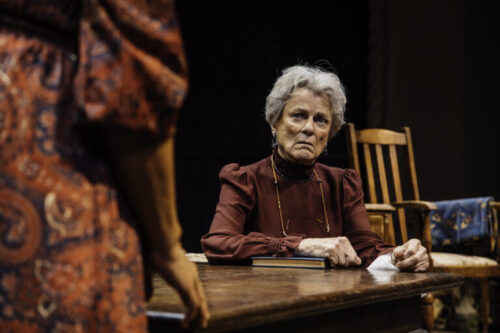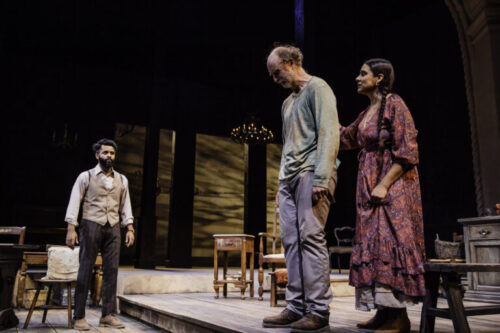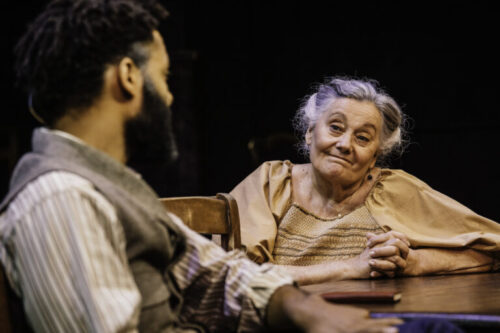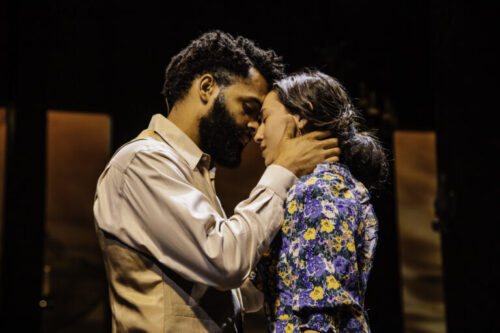SAY “UNCLE!”
Far be it from me to criticize Anton Chekhov. The long-deceased Russian playwright and short story writer is regarded as one of “The Greats” in all of literature; who am I to throw a dart at that great sky? It’s because of his prestige that I was actually looking forward to seeing a new translation of his 1898 play Uncle Vanya at the Pasadena Playhouse where the esteemed Michael Michetti is directing. Sadly, this production is more an exercise in extreme patience. Of course, Chekhov’s tragicomedy is unequivocally about miserable people who’ve all the time in the world — or at least, two hours of our time — to tell us about it. It’s not exactly what you’d call a “fun night out.” That said, I can imagine versions of this play that might make all that misery palatable; or maybe, if we’re lucky, enjoyable or enlightening. But even with its strengths (and there are a few), this scattershot production is so all over the map it’s hard to make heads or tails of it. Where are we? When are we? Who’s in what play? And has anyone seen Chekhov’s gun?
Uncle Vanya takes place in a provincial Russian estate owned by the revered, retired Prof. Serebryakov (Brian George), at the turn of the last century. (This is going to be a lot, but if you want a succinct character breakdown — or “refresher” — read this helpful paragraph.) Managing the estate is Serebyrakov’s plain, headstrong daughter, Sonya (Sabina Zúñiga Varela), and her quirky Uncle Vanya (Hugo Armstrong), brother to Serebryakov’s late, former wife, Vera (Sonya’s biological mother). The ailing Serebyrakov has returned to the countryside with his new, much-younger wife, the ravishing Elena (Chelsea Yakura-Kurtz), to rest and recuperate. Also at the estate is an old nurse, Marina (Jayne Taini), and Vanya’s mother, Marya (Anne Gee Byrd). Making the rounds is a country doctor, Astrov (Brandon Mendez Homer), who — along with Serebyrakov’s beautiful wife, Elena — arouses romantic feelings by a couple of the estate’s inhabitants.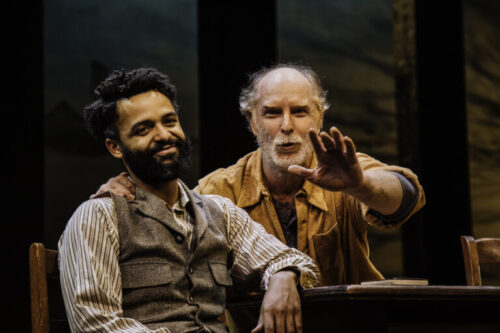
There isn’t so much a plot in this work as there is an exploration of the lives of its dispirited characters. Whether they’re wallowing in aging, dashed hopes and dreams, or unrequited love, none of these people have much left to live for. At best, they’re ravaged by ennui. At worst, they’re contemplating ways of extinguishing their own life, or others’. They eat, drink, and sleep on repeat. The ones who actually want more out of life are going crazy without it. These people are bored and miserable — a contagion that perhaps infected some non-returning theatergoers come intermission. Thank you, Chekhov?
To be fair, there are themes running through this work that, over a century later, are still relatable — important even — especially considering our modern understanding of depression and mental health. Anyone cooped up during COVID quarantine can relate to wondering if maybe, just maybe, we’re doing life wrong. Any chance of connection to these characters, however, is lost in an ill-conceived production that fails to ground itself in any clear, or relatable, reality.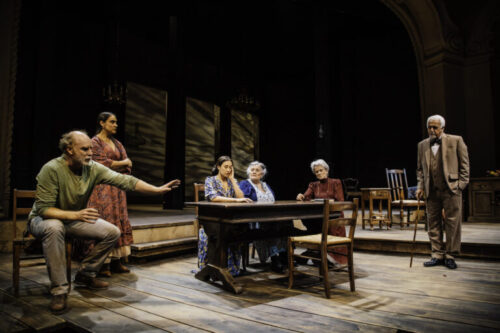
Let’s start with the English translation by Richard Nelson, Richard Pevear, and Larissa Volokhonsky. While it may, or may not, be a “good” one (I don’t read or speak Russian to even begin asserting how well their words translate Chekhov’s century-old language), it creates for a confusing experience. Yes, it uses a modern vernacular so audiences will have no problem understanding it. But it maintains an outdated form of storytelling whereby characters speak via philosophical treatise, or hit us over the head with their innermost thoughts. Perhaps Chekhov didn’t have this luxury, but audiences have become really good at understanding subtext in art over the past 120 years, especially when the acting’s competent.
So what may be missing here is not just a new translation, but a new adaptation altogether. I kept thinking throughout the production, especially when characters would state the obvious, that nobody (in art) talks like this now. This is where I wanted this production to either completely modernize the work by setting it present day (i.e. a completely new adaptation, or even an “inspired by” work), or immerse us fully in a very obvious “Russia at the turn of the last century” world, even with its outdated forms of language and storytelling. With the latter, my hopes would be that by meeting Uncle Vanya in its original time and place, we could maybe better understand its people and relate.
Alas! I don’t get to critique what wasn’t, only what was. And in this production, Michetti’s direction is frustratingly unclear, with representations from all kinds of eras and places. For instance, a multi-racial cast speaking in a modern vernacular makes it appear we’re in modern times. As do some of Wendell C. Carmichael’s fantastic costumes. But even they, along with various hairstyles, seem to come from different world cultures (including Spanish, perhaps?) and eras (a modern guitar to last-century attire). The set by Tesshi Nakagawa, finely lit by Jaymi Lee Smith, certainly has an old world, rustic quality to it. (But perhaps it could be a modern country house devoid of the usual amenities?) And yet, Russian character names are largely kept intact. And the text, as transcribed here, doesn’t do anything to assert a new time or place from the original Russian. The end result is a production that tries to be everything at once, which only leads to unnecessary confusion. 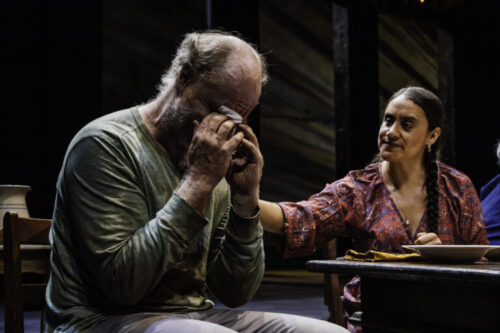
As for the performances, they, too, are all over the map — both in style and quality. For the longest time I thought Hugo Armstrong (as Vanya) was acting in his own strange play. I get that the character is sort of a “kooky old coot” fueled by vodka and unfulfillment, but the starts and stops of Armstrong’s prosody come across as those of a drunken American in a modern dive bar, not a late 1800s Russian. Armstrong spits and pounds tables. (I thought scenery would certainly be chewed.) But — dare I say — the more we learn about Vanya, Armstrong might have been the only one in the “right” play, after all. His seemingly unhinged performance is heartbreakingly true. He hits an emotional depth no one else matches, uncovering the raw nerve of desperation running through Chekhov’s work.
As Vanya’s “plain” niece, Sonya, Sabina Zúñiga Varela is a joy to watch — even if she does feel a little too old, yet endearingly “glowing,” for the part. One can’t help but side with her when she, lovelorn, wears her heart on her sleeve. I just wish the text trusted such a fine actress to deliver the longings of Sonya’s heart without making it so literal and obvious. Her scene at the end of Act I with her stepmother Elena, played here by the illustrious Chelsea Yakura-Kurtz (whose beauty rivals her “trophy wife” character’s boredom with life), was perhaps the first moment in the show that really drew me in, despite, as I said, a script that could have benefitted from textual subtlety.
As the doctor (and love interest) Astrov, Brandon Mendez Homer is perfectly handsome, but comes across as stilted. If Armstrong as Vanya felt uncomfortably modern, Homer as Astrov reads more “stuffed shirt” and traditional. It’s hard understanding how they’re in the same play, and era, together, much less friends. Homer, as Dr. Astrov, does introduce environmental themes into the play through his impassioned pleas about the destruction of the forests. It’s a rather nice touch for a play written so long ago. If there’s one character I wish had more stage time it’s the play’s matriarch, Marya, played with a no-fuss, salt-of-the-earth assuredness by the great Anne Gee Byrd.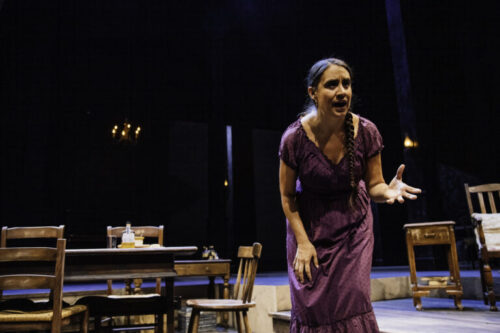
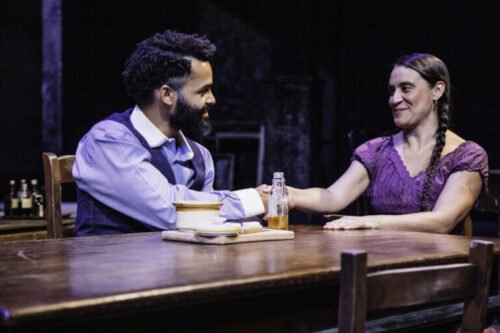
All in all, this Uncle Vanya was rather rough-goings. I confess there were moments when I, listless, caught myself noticing a crack in the back wall for far too long, thinking: maybe I can review that! The play’s rather bleak. Its theme seems to be: “Life’s a bitch and then you die.” (Not that I’d encourage that line for any modern adaptation.) Regardless, I got caught up in the ennui, fully feeling the moment at the top of Act II when Elena announces, “I’m dying of boredom.” Again, who am I to criticize a work from such a revered playwright? I’m just a lowly critic with marvelous taste. Look, Uncle Vanya’s a tough sell, especially with a production that fails to unite its elements cohesively. If it were written by anyone other than a “Great,” it would be much easier to tell you to skip it and treat yourself to anything that makes life worth living instead — even if you have to start simple with, let’s say, ice cream. Yes, ice cream! Dare I say, if Chekhov and his agonizing characters had eaten more ice cream, we might not be in this mess. Then again, if they’d had ice cream, we might not have Chekhov. So … there’s that.
photos by Jeff Lorch
Uncle Vanya
Pasadena Playhouse, 39 S. El Molino Ave. in Pasadena
ends on June 26, 2022
for tickets, call 626.356.7529 or visit Pasadena Playhouse
